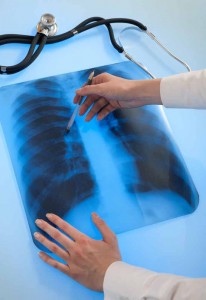-
Cancer
Mayo Clinic Researchers Identify Biomarker for Smoker’s Lung Cancer
Mayo Clinic researchers have shown that a specific protein pair may be a successful biomarker for identifying smoking-related lung cancers. The protein is called ASCL1. ASCL1 is known to control neuroendocrine cell development and was previously linked to regulation of thyroid and small cell lung cancer development, but not smoking-related lung cancer. The findings appear today in the online issue of the journal Oncogene.
“This is exciting because we’ve found what we believe to be a ‘drugable target’ here,” says senior author George Vasmatzis, Ph.D., a Mayo Clinic molecular medicine researcher and senior author on the study. “It’s a clear biomarker for aggressive adenocarcinomas, these are the fast-growing cancer cells found in smokers’ lungs."
To read the full news release click here.








